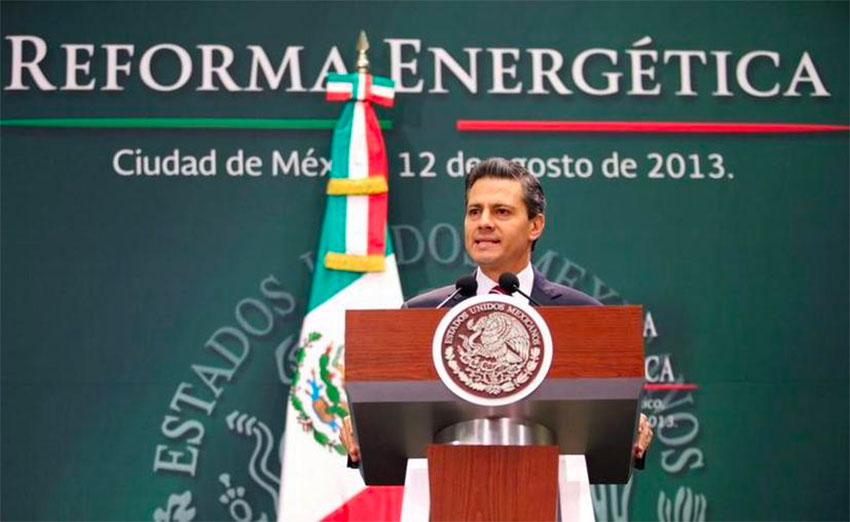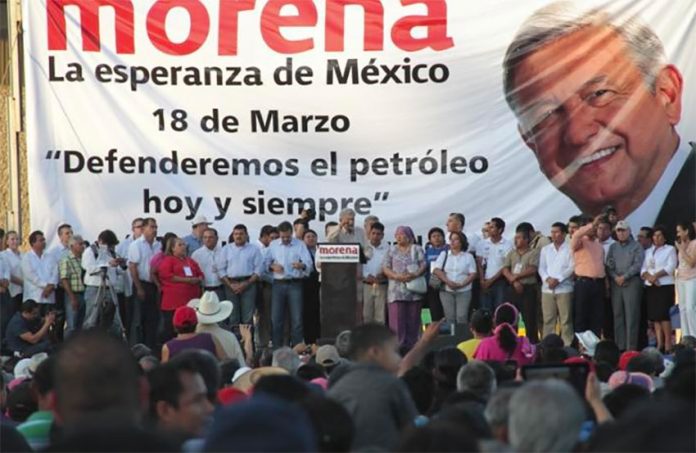The previous government’s sweeping energy reform, which opened up the energy sector to private and foreign companies, may need to be reversed in order to save Pemex, President López Obrador said in a memorandum to government officials and energy regulators.
In the July 22 memorandum, seen by the Bloomberg news agency and the newspaper El Financiero, López Obrador wrote that a constitutional change shouldn’t be ruled out in order to allow his administration to achieve its “higher goal” of recovering state control over the oil and electricity industries.
The president has made rescuing Pemex, the heavily indebted state oil company, and the Federal Electricity Commission (CFE) a central aim of his government.
“We must advance to the limit permitted by the current legal framework. However, if in order to apply the new rescue policy to Pemex and CFE we need to propose a new energy reform, we don’t rule out that possibility,” López Obrador said in his memo.
The president also floated the possibility of scrapping the 2013 energy reform at a news conference last week, saying he could present a new reform in 2022.
To get rid of the existing energy reform, López Obrador would need the support of two-thirds of Congress. A coalition led by the ruling Morena party has a majority in both houses of Congress but it falls short of the two-thirds needed to make constitutional changes.
However, the Morena-led coalition could increase its majority at next year’s midterm elections or by persuading opposition party lawmakers to join its ranks.
López Obrador, long an outspoken critic of the energy reform enacted by his predecessor, has already suspended oil block auctions, through which the former government sold exploration and drilling rights to private and foreign companies, while the Energy Ministry (Sener) published a new energy policy in May that imposed restrictive measures on the renewable energy sector, paving the way for the CFE to consolidate control.
The moves have angered private energy companies, some of which launched legal action against the Sener policy, and the proposal to reverse the 2013 energy reform will only rile them further.
In his memo, the president charges that the 2013 reform, through which more than 100 contracts were awarded to private companies, amounted to “politics of pillage.”
He also claims that the reform was approved due to “bribes given to the majority of lawmakers and through media deception.”

Former Pemex CEO Emilio Lozoya, currently awaiting trial on corruption charges, reportedly told the federal Attorney General’s Office that part of a US $6-million bribe paid to the government by Brazilian construction company Odebrecht was used to buy the support of opposition party lawmakers.
However, Lozoya’s evidence – including at least 12 videos that allegedly show lawmakers accepting bribes – has not yet been presented in court.
In his memorandum, López Obrador also seeks to persuade energy sector regulators to support his plans for the industry.
According to El Financiero, the president summoned the chiefs and commissioners of the Energy Regulatory Commission (CRE), the National Hydrocarbon Commission (CNH) and the National Energy Control Center (Cenace) to a meeting in late July at which the memo was read to them.
“I maintain that the regulatory bodies created during the neoliberal period must adjust to the new economic and energy policies and their mission must be to join efforts with the Energy Ministry, Pemex and the CFE to rescue the nation’s oil and electricity industry,” the memo says.
The CRE, CNH, Cenace and other “supposedly autonomous” regulators mustn’t be allowed to become “mere instruments” for the benefit of the private sector, “as was the intention of the privatizing [government] technocrats and their bosses,” it says.
Unnamed sources who attended the meeting told El Financiero that López Obrador asked the regulatory body officials whether the government’s new energy policies could be carried out within the framework of the 2013 reform or whether it needed to be changed.
The presidential memo asks the regulators to abolish subsidies currently provided to private energy companies and to stop issuing new project permits to them.
In addition, it sets out a range of government aims. Among them: not increasing fuel and electricity prices in real terms, achieving energy self-sufficiency, increasing oil production to 1.8 million barrels per day this year and 2.2 million by 2024, upgrading existing refineries and completing the new one on the Tabasco coast and building power plants on the Yucatán and Baja California peninsulas in order to meet electricity demand.
The memo also proposes limiting private sector energy generation to 46% of Mexico’s consumption and increasing the use of hydroelectric power, and says that criminal complaints will be filed if proof of corruption is found in existing contracts with private companies.
Pemex and the CFE must be supported so that their participation in the national market doesn’t decrease further, López Obrador writes while also asserting that corruption within the two state-owned companies must be eliminated.
Source: Bloomberg (en), El Financiero (sp)
